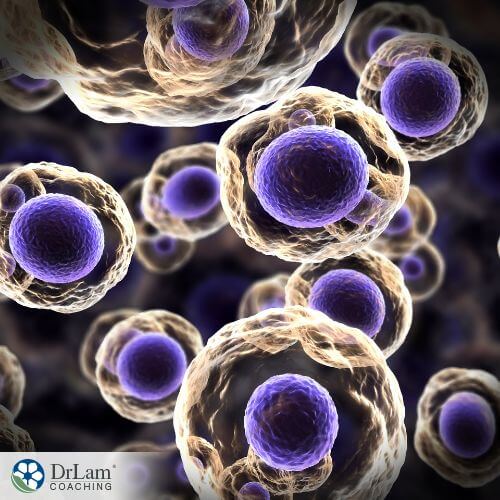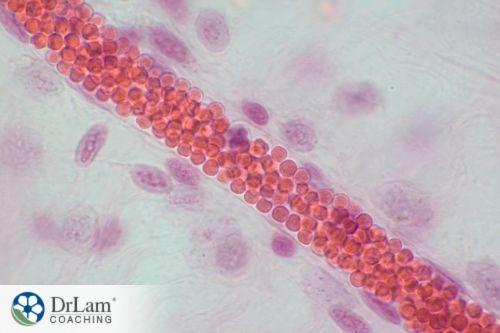 Exosomes were first observed in the early 1980s in the culture medium of reticulocytes, or immature red blood cells. The term “exosomes” was coined for such vesicles as the intra-luminal vesicles (ILV). Also, they were first described thirty years ago as tiny bubbles with a diameter of about 40-100 nm that can be secreted by most cells. Since then, studies implicate exosomes in cell-to-cell communication, disease identification, and the transmission of diseases. Furthermore, exosomes have been explored as a means of drug discovery. These uses and disadvantages of exosomes will be the focus of this article.
Exosomes were first observed in the early 1980s in the culture medium of reticulocytes, or immature red blood cells. The term “exosomes” was coined for such vesicles as the intra-luminal vesicles (ILV). Also, they were first described thirty years ago as tiny bubbles with a diameter of about 40-100 nm that can be secreted by most cells. Since then, studies implicate exosomes in cell-to-cell communication, disease identification, and the transmission of diseases. Furthermore, exosomes have been explored as a means of drug discovery. These uses and disadvantages of exosomes will be the focus of this article.
Exosomes are extracellular vesicles (EVs) that all cells in the body produce that the cells then excrete to send out into the extracellular space. They carry genetic information and signaling proteins to other cells with instructions. For example instance, breastmilk is one of the richest sources of exosomes, which help pass immune instructions from the mother to the baby.
Exosomes contain a complex composition of molecules, including proteins, lipids, microRNA, and mRNA. They are enriched with lipids such as cholesterol, ceramide, glycolipid, GM3, sphingolipids, and glycerophospholipids containing long, saturated fatty-acyl chains.
According to an article in the journal Science, exosomes carry nucleic acids, proteins, lipids, and metabolites to recipient cells when circulating in the extracellular space. Additionally, they are mediators of near and long-distance intercellular communication in health and disease and impact different aspects of cell biology.
The forming of exosome is the work of the intraluminal vesicles (ILVs). However, their formation mechanism in the endosome remains a mystery. The process of formation of the ILV involves the membrane sprouting away from the cytoplasm and entering the endosome. This is unlike most traditional membrane sprouting that involves deformation and encapsulation into the cytoplasm. The non-traditional sprouting approach that is a key feature of exosomes occurs in the formation of ILV, and also when a coated virus emerges from the cytosol and cytokinesis takes place.
ILVs have at a minimum two mechanisms: one depends on endosomal sorting complexes required for transport (ESCRT), and the other doesn’t depend on ESCRT.
Every cell type secretes exosomes. They are in biofluids such as blood, saliva, breast milk, tears, amniotic fluid, culture supernatant, and urine. Research shows there are immune-derived exosomes, tumor-derived exosomes, and neuronal-derived exosomes.
Exosomal contents suggest the cell from which it originates. As such, it’s possible to make predictions about the immune signature of a specific type of exosome. Essentially, immune cell-specific markers can help determine markers for exosomes originating from a particular cell type. For example, exosomes derived from professional antigen-presenting cells express costimulatory molecules, like CD80 and CD86.
Research suggests that immune cell-derive exosomes can reshape a pro-inflammatory microenvironment to inhibit tumor progression. Additionally, it can promote tumor progression by stopping the killing effect of NK cells and CD8+T cells, for example, and also promote tumor cells and immunosuppressive immune cells.
Tumors occur in the tumor microenvironment (TME), which includes but is not limited to tumor cells and cancer-associated fibroblasts (CAFs). Fibroblasts are spindle-like cells that support collagen synthesis in connective tissues. Exosomes are crucial players in establishing cell-to-cell contact in the direct interaction between tumor cells and their environment. This interaction is important in tumor progression. Specifically, exosomes that tumor cells release into the extracellular milieu have the potential to promote angiogenesis, thrombosis, and the spread of tumors.
 Additionally, according to an article published in the journal Frontiers in Immunology, new studies show that CAF-derived exosomes also play an essential role in tumorigenesis, tumor cell proliferation, metastasis, drug resistance, and the immune response. CAFs have been discovered in the tumor stroma of different cancers and CAFs can promote malignant tumor behaviors primarily through the activity of particular metabolic pathways and secretion of biological factors like exosomes.
Additionally, according to an article published in the journal Frontiers in Immunology, new studies show that CAF-derived exosomes also play an essential role in tumorigenesis, tumor cell proliferation, metastasis, drug resistance, and the immune response. CAFs have been discovered in the tumor stroma of different cancers and CAFs can promote malignant tumor behaviors primarily through the activity of particular metabolic pathways and secretion of biological factors like exosomes.
Exosomal markers are present in several common cancers including:
Researchers have found that exosomes play a role in neurological disorders. Some propose that exosomes are novel mediators in the typical development and physiology of the nervous system. Essentially, they play functional roles in the development and regeneration of neurons. Also, exosomes function as mediators of cell-to-cell communication between neurons and other cells in the central nervous system (CNS).
However, studies suggest that neuronal-derived exosomes can spread “toxic” forms of mutated or misfolded proteins. There is a link between these protein types and neurodegenerative diseases. For example, there is an association between Alzheimer's disease, Parkinson's disease, and Prion disease with the proteins Amyloid beta, α-Synuclein, and Prion protein (PrP), respectively.
Adipose-derived mesenchymal stem cell (AD-MSC) exosomes are small, extracellular
vesicles that the adipose-derived mesenchymal stem cells release. These stem cells are found in adipose (fat) tissue and can change into various cell types, like adipocytes and chondrocytes.
Also, they are important components released by ASCs paracrine and are important mediators that contribute to their suitability to support tissue regeneration. This can be achieved through repair cells migration and proliferation (spread) of repair cells and other processes and specific functions in different tissues
Additionally, (AD-MSC) has anti-inflammatory, angiogenic, immunomodulatory, and regenerative properties.
Exosome function includes signaling, metabolism, cell death, and immunomodulation.
Protein markers, such as transmembrane protein, GPI-anchored protein, or cytosolic lipid, can be used to identify an exosome. The most common transmembrane protein markers to identify exosomes belong to the tetraspanin family of proteins. These markers help facilitate and regulate signaling events.
Also, the formation of the general exosome protein markers referred to as Multivesicular Body (MVBs) are regulated by the ESCRT. These molecules include TSG101 and Alix, cytoskeletal proteins, integrins, and annexins, and are enriched on exosomes. ESCRT-related proteins can be useful markers for exosome characterization and play a key role in exosome targeting and cell adhesion.
The exosome is characteristic of a non-traditional secretory pathway component. Almost every cell type secretes exosomes, and as such, their composition mirrors the host diversity. Also, it depends largely on the cell type from which they originate.
The molecular composition of exosomes reflects the physiological or pathophysiological changes that occur in the cell or tissue of origin. Subsequently, by analyzing exosome composition, there is a significant potential to develop new biomarkers to help with disease diagnosis.
Exosomes are pathways for cell communication and intercellular macromolecular transport. They play an important role in the transmission of proteins, lipids, mRNAs, miRNAs, and DNA. Also, there appears to be a connection between exosomes as the cause of several diseases. Furthermore, exosomes feature a lipid bilayer membrane structure.
With all these characteristics, exosomes could undergo development to act as a natural carrier of specific drugs. Specifically, they can protect the substances coated within and also target particular cells or tissues. In this sense, exosomes have the potential to serve as a well-targeted delivery system.
 Exosomes can play a significant role in signal transmission across large distances where simple diffusion is inadequate. Their small size and simple structure may even allow exosomes to cross the blood-brain barrier. Since they are crucial in cell-to-cell communication, exosome components have the potential for transfer directly to neighboring cells.
Exosomes can play a significant role in signal transmission across large distances where simple diffusion is inadequate. Their small size and simple structure may even allow exosomes to cross the blood-brain barrier. Since they are crucial in cell-to-cell communication, exosome components have the potential for transfer directly to neighboring cells.
If not by that medium, these components may shuttle across various cells before making it to their final destination by transcytosis--a process by which large molecules cross the blood-brain barrier into the central nervous system. As such, its implication in various physiological processes is noteworthy.
For instance, exosome signaling has been implicated in various processes that occur during pregnancy, including maternal metabolic and inflammatory adaptations, maternal-fetal vascular exchange, and placentation.
Exosomes may act as vectors for specific causes and effects of diseases. As mentioned earlier, tumor cell-derived exosomes play an active role in tumor angiogenesis and tumor proliferation. Similarly, there is a link between exosomes shed from stimulated blood cells and the vascular endothelium and neurological disorders. These disorders include multiple sclerosis, transient ischemic attacks, and antiphospholipid syndrome (APS).
Furthermore, exosomes have the potential to transport damaged cellular material selected to be destroyed. This action spreads toxic forms of aggregated proteins like α-synuclein and prion proteins. Consequently, it contributes to the progression of neurodegenerative diseases.
Some experts believe that exosomes may be the real cause of the spread of cancer, but agree that they can also suppress tumor cells. According to an article in the Journal of Hematology & Oncology, tumors release millions of exosomes carrying their protein and genetic content. They behave like “radars,” ensuring the receiving organs are primed to receive the tumor cells. Specifically, exosomes activate the required molecular reactions, such as inflammation and angiogenesis, in the receiving organs to welcome the tumor cells to proliferate.
Furthermore, tumor‐derived exosomes also trigger the differentiation of mesenchymal stem cells (MSC) into myofibroblasts that exhibit pro‐angiogenic and pro‐invasive features. In so doing, the differentiated MSC then further promote the spread of cancer and invasion. This process involves the secretion of both growth and matrix‐regulating factors.
However, other research suggests that exosomes can be a suppressant. An article in Archives of Pharmacal Research suggests that exosome administration directly to cancer cells or delivery to immune cells in the tumor microenvironment can suppress tumor progression. The resulting impact is triggering an anti-tumorigenic function via immune activation.
It appears, according to researchers, that depending on their cargo, exosomes can suppress or promote tumor cell progression.
Exosome applications in human health offerings are gaining more attention. These applications include biomarkers, drug delivery, exosomes therapy
In the instance of disease, cellular changes can be recognized in the biological component of exosomes that cells release. Researchers maintain that the changed cargo of exosomes can be identified and analyzed using transcriptomics, proteomics, and lipidomics investigations. As such, any differences in the levels of specific molecules are helpful for biomarker application. Exosomes are abundant in cancer patients and can be connected to the tumor microenvironment, which can promote exosome release. In that vein, exosomal proteins, for instance, have biomarker potential for many cancers.
 The examination of exosomes as new-generation vehicles for drug delivery is an important one. This, according to published work in Frontiers in Cell and Developmental Biology, is due to their unique properties, including their innate stability, low immunogenicity, and excellent tissue/cell penetration capacity. Furthermore, an exosome encompasses different biomolecules, such as proteins, nucleic acids, and lipids. This makes them naturally attractive drug delivery vehicles.
The examination of exosomes as new-generation vehicles for drug delivery is an important one. This, according to published work in Frontiers in Cell and Developmental Biology, is due to their unique properties, including their innate stability, low immunogenicity, and excellent tissue/cell penetration capacity. Furthermore, an exosome encompasses different biomolecules, such as proteins, nucleic acids, and lipids. This makes them naturally attractive drug delivery vehicles.
AD-MSC exosomes are gaining popularity for their potential therapeutic applications. As pointed out earlier, these exosomes have anti-inflammatory, angiogenic, immunomodulatory, and regenerative properties. As such, there are beneficial therapeutic agents in addressing various conditions, such as degenerative diseases, inflammatory disorders, and tissue injury.
A few of the potential therapeutic applications of AD-MSC exosomes include:
EVs can deliver an array of molecules to nearby targets or over long distances as noted earlier, which allows the mediation of different biological functions. This particular delivery mechanism is beneficial for developing therapeutic strategies like vaccination.
Exosome-based vaccines have potentially positive outcomes against several types of infectious diseases and cancers, both in vitro and in vivo. About cancers, research suggests that exosomes from innate immune cells and tumor cells could potentially work as cancer vaccines. However, the dual effects of exosomes, specifically, their role in tumor progression and anti-tumor suppression, represent a challenge in using exosome-based vaccines.
Stem cells are potent anti-inflammatory agents that have the potential to target inflammation throughout your body. When it comes to fatigue, chronic or otherwise, there is an association with inflammation. Exosomes can decrease inflammation and boost your immune system and stimulate healing. As a result, this may help alleviate certain underlying health issues that contribute to chronic fatigue.
If you suffer from adrenal fatigue, which is the non-Addison's form of adrenal dysfunction, where the body's stress response cannot keep up with life's chronic stressors, your body activates an inflammatory response. Your adrenal glands secrete cortisol to control this inflammation and the Inflammation Circuit of the NEM response becomes imbalanced. Also, the immune system, gastrointestinal tract, and microbiome regulate the Inflammation Circuit, which helps to control inflammation in your body. When the inflammation circuit becomes imbalanced, inflammation gets out of control and leads to new health issues.
Since exosomes can trigger anti-inflammatory effects, it appears that they can be beneficial for use as therapeutic agents in Adrenal Fatigue Syndrome (AFS). Additionally, studies show that exosomes can accurately deliver proteins, nucleic acids, small molecules, and nanoparticles to the inflammatory microenvironment.
 At present, the Food and Drug Administration (FDA) has only approved certain stem cell products that are used in therapies for particular cancers, disorders of the blood, and immune system. While the FDA regulates stem cell and exosome products in the United States, it is yet to approve any exosome products for any use. Patients should be aware of the potential risks of exosomes.
At present, the Food and Drug Administration (FDA) has only approved certain stem cell products that are used in therapies for particular cancers, disorders of the blood, and immune system. While the FDA regulates stem cell and exosome products in the United States, it is yet to approve any exosome products for any use. Patients should be aware of the potential risks of exosomes.
According to the Centers for Disease Control and Prevention (CDC), recently, patients in Nebraska who got treatment with products marketed as containing exosomes experienced serious adverse events, including bacterial infections. Any treatment with an exosome product would require FDA review and approval. As such, be aware of clinics that may falsely advertise that the FDA is unnecessary when it comes to reviewing and approving their stem cell therapies. Furthermore, if you are considering an exosome product, ask your healthcare provider to show you FDA documentation and that they have received the FDA’s permission to research the product. Essentially, ensure that you have this information before getting the therapy.
Some drawbacks of exosomes include the following:
Exosomes are intercellular messengers that control signaling. They offer new possibilities, from exosome vaccination to exosome therapy. If you think that these therapies may be a good option for you and want to learn more about exosomes, visit your doctor to talk about whether exosomes could help manage your symptoms. However, be aware that many of these therapies are experimental and could come with serious side effects or be ineffective.
If you would like to learn about natural ways to reduce inflammation, the team at Dr. Lam Coaching can help. We offer a free** no-obligation phone consultation at +1 (626) 571-1234 where we will privately discuss your health concerns and various options. You can also send us a question through our Ask The Doctor system by clicking here.
Chen, Huizhi, et al. “Exosomes, a New Star for Targeted Delivery.” Frontiers in Cell and Developmental Biology, vol. 9, 2021, p. 751079, doi:10.3389/fcell.2021.751079.
Kalluri, Raghu, and Valerie S. LeBleu. “The Biology, Function, and Biomedical Applications of Exosomes.” Science (New York, N.Y.), vol. 367, no. 6478, 2020, eaau6977, doi:10.1126/science.aau6977.
Kim, Sang Bum. “Function and Therapeutic Development of Exosomes for Cancer Therapy.” Archives of Pharmacal Research, vol. 45, no. 5, 2022, pp. 295-308, doi:10.1007/s12272-022-01387-1.
Paskeh, Mahshid Deldar Abad, et al. “Emerging Role of Exosomes in Cancer Progression and Tumor Microenvironment Remodeling.” Journal of Hematology & Oncology, vol. 15, no. 1, 2022, p. 83, doi:10.1186/s13045-022-01305-4.
Peng, Lushan, et al. "Emerging Role of Cancer-Associated Fibroblasts-Derived Exosomes in Tumorigenesis." Frontiers in Immunology, vol. 12, 2022, p. 795372, doi:10.3389/fimmu.2021.795372.
Rezaie, J., M. Feghhi, and T. Etemadi. "A Review on Exosomes Application in Clinical Trials: Perspective, Questions, and Challenges." Cell Communication and Signaling, vol. 20, 2022, p. 145, doi:10.1186/s12964-022-00959-4.
Some exosome applications include use as biomarkers, vaccine, fatigue management, drug delivery, and targeted therapy. Lack of FDA approval, unknown potential risks, potentially for wrong cell signaling, and the possibility of spreading an infectious disease are all possible drawbacks.
